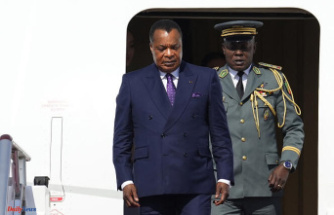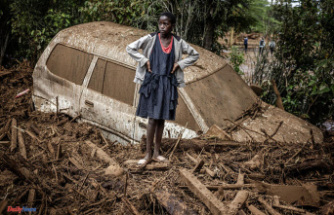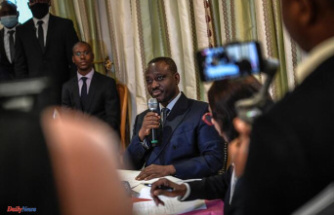In 1994 the English band Bush released their groundbreaking debut album "Sixteen Stone", which went sixfold platinum. After their initial grunge streaks, the four-piece consisting of frontman Gavin Rossdale, guitarist Chris Traynor, bassist Corey Britz and drummer Nik Hughes change their musical direction with almost every album - a decision he wouldn't make like today Rossdale admits. In an interview with ntv.de, the singer and ex-husband of rock girl Gwen Stefani talks about the ninth album "The Art of Survival", Bush's musical change and his "usual mixture of stupidity and insight".
ntv.de: You were unlucky with your last album, "The Kingdom" - it was released on time for the first lockdown, so you couldn't go on tour. How did you approach "The Art of Survival" now - did you wait until the worst was over?
Gavin Rossdale: We just finished it. The decision to release The Kingdom during a pandemic wasn't a good idea commercially. From an artistic point of view, both for the band and for the fans, yes. We had the album done and didn't want to sit on it. Also, we didn't want to wait and have to explain songs that were two or three years old later.
Is the album title "The Art of Survival" a reflection of the past two and a half years?
Yes, everyone has their own story and has been through a lot. Some more, some less, some others have died. We kind of move in between. I think every story you hear has its own success in overcoming this insane obstacle. And it goes even further, it still resonates.
Did you try to reflect that on the record as well?
I think so. I only ever write about the human spirit - mine or that of the people around me. People are very inspiring when you listen to them and learn about their lives.
You were born in London in 1965, so you saw the beginnings of rock and punk rock. How do you remember this time?
It was awesome because I was 13 years old when punk was big in England. That was a very impressive time, a real revolution, a youth movement that hasn't been seen since! Now people have seen everything. There's a lot of movement, but people aren't so easily shocked anymore. For me, this time represents young versus old, children versus authority. I've always had a big problem with authorities, I don't like them. (laughs) That gave me a real spirit. And funnily enough - even though I would never do punk today and don't get into this American pop punk - it was this anger, this energy, that appealed to me. I always try to make music that sounds like it comes with a price. It didn't make me the most successful or popular musician, but it kept me true to my spirit. And we never lost that as a band. And if they did, then because the music became even more depressive and dark. (laughs)
Has the movement inspired you to make music yourself?
I didn't really think about that at the time. When I was a kid, my sister's boyfriend had a band. I often went to their rehearsals and loved being in this environment. I think it eroded my DNA more than I realized. A few years later, when I finished school and was faced with the decision of what to do now, I just thought to myself: oh god, the last thing I want is a job! So what can I do that isn't a job but is a job? That's how I came up with wanting to be a singer, to express myself and be free. My desire to be a singer was a desire to run away from the establishment and expectations.
Did you find writing easy from the start?
I had an ability to do it. No idea why. I just got into it, sang something into a tape and just kept going - it was my usual mix of stupidity and insight. (laughs) The combination of these two traits is the source of how I pushed myself to write songs. That's the punk aesthetic: I just pull myself together and decide to do something without having learned anything.
How does your work on an album look like? Are you writing lyrics and your colleagues are thinking about a suitable melody?
We have a studio where I write songs - alone, without the presence of the others. Only when I've finished writing do I present it to them and they play something along with it. It's not that other people make me nervous, I just don't want to show them the songs until I get them right.
Because you are a perfectionist or because of the possible rejection?
Because I think perfection is the right direction. (laughs) You'll never be perfect, but at least you're moving in that direction. Of course, there are always songs that get lost and are not recorded. Rejection is a natural thing and I'm at a point where I can roughly assess which songs are being rejected and which are being worked on. I don't have a very big ego either.
Are there any songs that made it onto an album that you don't remember why?
There are definitely songs I wish I'd worked harder on. My contribution is to decide when a song is finished. Sometimes that instinct was premature. (laughs) For example, I wish the album "Razorblade Suitcase" (1996) had been edited more, cut around and made it more efficient. We just left everything in. The song "The People That We Love" (2001) originally had different lyrics, which we unfortunately didn't decide on in the end. I just don't play those things live anymore.
When you started Bush in the early 1990s, Brit-Pop and Grunge were in full swing. Your first two albums were also a bit more grunge. Did you then consciously decide to go in a different direction?
That was probably my fault. My colleagues wanted something more traditional. But when we were working on "The Science of Things" (1999) I was just coming from London, where there was a remix, club and dance culture. And I was like, Wow, it's weird that I don't take any of that into my music. So I tried to add a more modern sound. I don't know if that was the right decision - probably not... (laughs) Maybe we should have stayed traditional, then we would be filling stadiums now!
How would you describe the change in your albums?
Actually, every record has taken a completely different direction than its predecessor - except for "The Art of Survival". It's like the sequel to "The Kingdom". "The Kingdom" was about finding that sacred ground and trust in community and hope. With the Black Lives Matter movement and people losing their jobs or dying because of Covid, the whole world seemed to collapse. It started with a pandemic and then we drifted into a civil rights movement in the US with the murder of George Floyd. Our long player was like an idealized utopia: if we are more conscious, we are better people and then we are all better off. It was about coming together and finding an antidote to loneliness. To the power of the masses, the strength of a peaceful revolution.
And how does "The Art of Survival" fit in there?
It was more like: oh my god, we've been so beat up over the last two and a half years, how are we going to get through it? (laughs) Luckily we made it. Let's see what the next record is about...
But then it paid off to keep going in a new direction, didn't it?
Anyone who's spent a lot of time in bands eventually accepts where their band is. Every day is a new day where we have to prove ourselves, where we have to get people interested in us. On the one hand I feel successful, but on the other hand I feel very grounded and realistic about our place on earth. I don't think we're particularly seismic. It's just a band putting out records and trying to do a good job and good shows. What I just meant is: Sometimes I think to myself that I would have been more successful if I had stuck to one thing. My desire to stay interesting wasn't the best financially. Maybe it was the best artistic way, I don't know.
Do you regret pursuing this desire?
No, because I felt conviction every time. I spend more time on our songs than anyone, they start and they end with me. Sometimes I delve too deeply into them, and then the view from the outside is missing. I go with what speaks to me and inspires me.
Ultimately you make the decisions - also in terms of direction - but together as a band, right? And you certainly have people around you who also give their opinions?
Yes of course. When I walk into the studio, there's already a very opinionated guitarist and a very opinionated producer. (laughs) For me, that means that my ideas have to be clear. That's why it's better if I don't wear them out until they're final. Then you can change anything. Of course we collaborate. But as the primary songwriter, I have to present the aesthetic and then the others can add something.
You've also tried your hand at being a solo artist. What direction did you go there?
A completely different one! On my solo record "Wanderlust" was really collaborative and I also wrote a lot with other people in the same room. Pretty funny actually, since a solo album is actually more like "This is the real me!" should be. (laughs)
Was she "the real you"?
Well, every record is "the real me". I don't understand when artists say "This is the real me" about their new record. I always ask myself: where were you during the last one? (laughs) You have to have the belief that at all times you are making the music that reflects your mood, your thoughts and your status. That's what you are
But in the end it drew you back to Bush...
Yes, I consider myself very fortunate to be surrounded by good people, whether it's a producer, a guitarist, a bassist or a drummer. When you include them, they contribute something very special. And we are good friends too. We're not one of those bands that have been working together for a long time but have completely separate lives and can't stand each other. We like to spend a lot of time together, also outside of work.
Bush has been around for 30 years now - what's the biggest change you've seen?
People don't buy records anymore. It used to be a nice equation: you make something and people buy it. Today you do something and give it away. (laughs) Spotify and the labels are still making the fat while the artists are wondering what happened. That was challenging. I'm grateful and I don't want to complain. There's nothing worse than someone complaining about how great it used to be. I'm lucky to have been in that position. I feel more sorry for the young bands because I don't quite understand how they are supposed to exist like this.
Is there anything you wish you had known earlier?
Always, that's wisdom, isn't it? I wish I was wiser and smarter. As you get older, you realize that your time is limited. You don't think about that at all in the beginning and you're free. I would have liked to work harder if I knew my time was running out. Of course we always tried to make good music. But sometimes I think I was actually better than what we did.
Linn Penkert spoke to Gavin Rossdale
The Art of Survival is available everywhere now.












